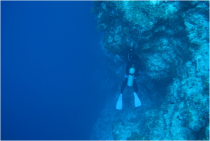Natural marine chemical compounds as materials for drugs As a tool in chemical epigenetics

- researcher's name
- affiliation
- research field
-
Biomolecular chemistry
- keyword
-
background
Marine sponges and other marine invertebrates are untapped treasure troves of low molecular weight compounds, a lot of which are biosynthesized by symbiotic microorganisms. Symbiotic microorganisms are generally extremely difficult to cultivate, making them unique screening libraries.
summary
Samples of marine organisms: Over 1,500 species, including marine sponges, coelenterates, protochordates, echinoderms, and mollusks.
A diverse range of sampling areas: Japan (Ryukyu Islands, coastal Kyushu, Izu Islands, Sado Island, coastal Sanriku, Kuril Islands), Micronesia, Vietnam.
Natural marine chemical compounds: A library of new and already known natural marine chemical compounds.
We are targeting the library of chemicals extracted from marine invertebrates to carry out screening for antibacterial and antimold chemicals, growth inhibitors that work on various cancer cells, chemicals that inhibit angiogenesis and various enzymes, cytotoxins, bacteria with resistance to multiple drugs, etc. Over 100 varieties of new chemical compounds that clearly stimulate biological activity have so far been identified.
application/development
●Pharmaceutical lead compounds: The development of drugs such as antiangiogenics, antiinfectious chemicals, enzyme inhibitors, myocardial regeneration drugs, etc.
●Tools for stem cell research for regeneration treatment
●Tools for chemical epigenetics research relating to cell differentiation regulation and malignant transformation
●Development of screening methodology for targeted biologically active substances
predominance
We have identified “anticancer lead compounds,” “anti-Leishman agents,” “structural change inducers for nucleosomes,” “chemical compounds to boost efficiency of ES/iPS cells in differentiating into the heart,” “stimulants that maintain ES cells in an undifferentiated state,” “symbiotic microorganisms that produce natural, useful compounds,” etc.
purpose of providing seeds
Sponsord research, Collaboration research, Technical consultation
same researcher's seeds
posted:
2014/05/21





